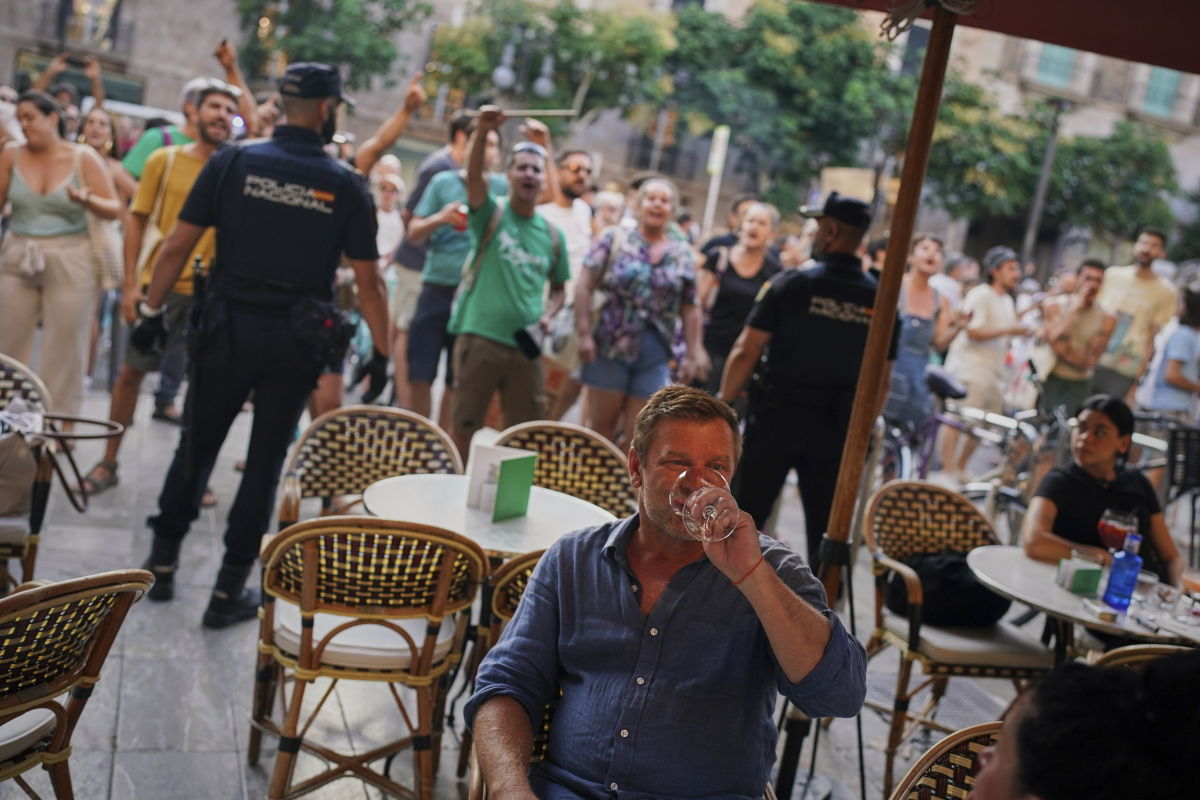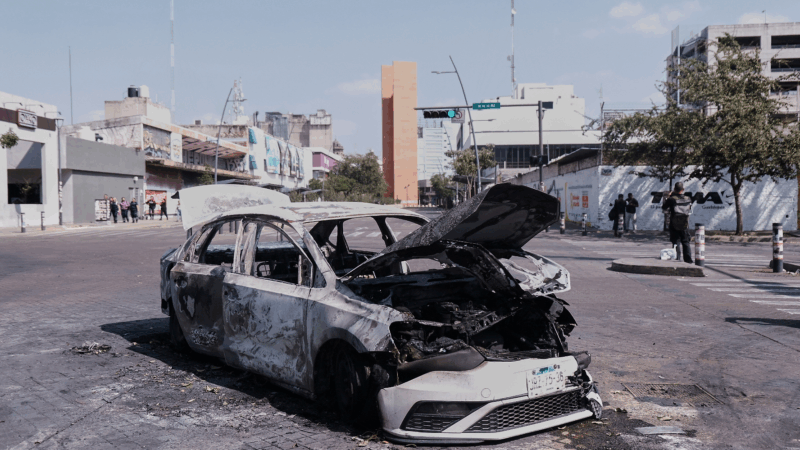Spaniards turn water pistols on visitors to protest mass tourism
BARCELONA, Spain — Protesters used water pistols against unsuspecting tourists in Barcelona and on the Spanish island of Mallorca on Sunday as demonstrators marched to demand a rethink of an economic model they believe is fueling a housing crunch and erasing the character of their hometowns.
The marches were part of the first coordinated effort by activists concerned with the ills of overtourism across southern Europe’s top destinations. While several thousands rallied in Mallorca in the biggest gathering of the day, hundreds more gathered in other Spanish cities, as well as in Venice, Italy, and Portugal’s capital, Lisbon.
“The squirt guns are to bother the tourists a bit,” Andreu Martínez said in Barcelona with a chuckle after spritzing a couple seated at an outdoor café. “Barcelona has been handed to the tourists. This is a fight to give Barcelona back to its residents.”
Martínez, a 42-year-old administrative assistant, is one of a growing number of residents who are convinced that tourism has gone too far in the city of 1.7 million people. Barcelona hosted 15.5 million visitors last year eager to see Antoni Gaudí’s La Sagrada Familia basilica and the Las Ramblas promenade.
Martínez says his rent has risen over 30% as more apartments in his neighborhood are rented to tourists for short-term stays. He said there is a knock-on effect of traditional stores being replaced by businesses catering to tourists, like souvenir shops, burger joints and “bubble tea” spots.
“Our lives, as lifelong residents of Barcelona, are coming to an end,” he said. “We are being pushed out systematically.”

Around 5,000 people gathered in Palma, the capital of Mallorca, with some toting water guns as well and chanting “Everywhere you look, all you see are tourists.” The tourists who were targeted by water blasts laughed it off. The Balearic island is a favorite for British and German sun-seekers. It has seen housing costs skyrocket as homes are diverted to the short-term rental market.
Hundreds more marched in Granada, in southern Spain, and in the northern city of San Sebastián, as well as the island of Ibiza.
In Venice, a couple of dozen protesters unfurled a banner calling for a halt to new hotel beds in the lagoon city in front of two recently completed structures, one in the popular tourist destination’s historic center where activists say the last resident, an elderly woman, was kicked out last year.
‘That’s lovely’
Protesters in Barcelona blew whistles and held up homemade signs saying “One more tourist, one less resident.” They stuck stickers saying “Citizen Self-Defense,” in Catalan, and “Tourist Go Home,” in English, with a drawing of a water pistol on the doors of hotels and hostels.
There was tension when the march stopped in front of a large hostel, where a group emptied their water guns at two workers positioned in the entrance. They also set off firecrackers next to the hostel and opened a can of pink smoke. One worker spat at the protesters as he slammed the hostel’s doors.
American tourists Wanda and Bill Dorozenski were walking along Barcelona’s main luxury shopping boulevard where the protest started. They received a squirt or two, but she said it was actually refreshing given the 83 degree Fahrenheit (28.3 degrees Celsius) weather.
“That’s lovely, thank you sweetheart,” Wanda said to the squirter. “I am not going to complain. These people are feeling something to them that is very personal, and is perhaps destroying some areas (of the city).”
There were also many marchers with water pistols who didn’t fire at bystanders and instead solely used them to spray themselves to keep cool.
Crackdown on Airbnb
Cities across the world are struggling with how to cope with mass tourism and a boom in short-term rental platforms, like Airbnb, but perhaps nowhere has surging discontent been so evident as in Spain, where protesters in Barcelona first took to firing squirt guns at tourists during a protest last summer.
There has also been a confluence of the pro-housing and anti-tourism struggles in Spain, whose 48 million residents welcomed record 94 million international visitors in 2024. When thousands marched through the streets of Spain’s capital in April, some held homemade signs saying “Get Airbnb out of our neighborhoods.”

Spanish authorities are striving to show they hear the public outcry while not hurting an industry that contributes 12% of gross domestic product.
Last month, Spain’s government ordered Airbnb to remove almost 66,000 holiday rentals from the platform that it said had violated local rules.
Spain’s Consumer Rights Minister Pablo Bustinduy told The Associated Press shortly after the crackdown on Airbnb that the tourism sector “cannot jeopardize the constitutional rights of the Spanish people,” which enshrines their right to housing and well-being. Carlos Cuerpo, the economy minister, said in a separate interview that the government is aware it must tackle the unwanted side effects of mass tourism.
The boldest move was made by Barcelona’s town hall, which stunned Airbnb and other services who help rent properties to tourists by announcing last year the elimination of all 10,000 short-term rental licenses in the city by 2028.
That sentiment was back in force on Sunday, where people held up signs saying “Your Airbnb was my home.”
‘Taking away housing’
The short-term rental industry, for its part, believes it is being treated unfairly.
“I think a lot of our politicians have found an easy scapegoat to blame for the inefficiencies of their policies in terms of housing and tourism over the last 10, 15, 20 years,” Airbnb’s general director for Spain and Portugal, Jaime Rodríguez de Santiago recently told the AP.
That argument either hasn’t trickled down to the ordinary residents of Barcelona, or isn’t resonating.
Txema Escorsa, a teacher in Barcelona, doesn’t just oppose Airbnb in his home city, he has ceased to use it even when traveling elsewhere, out of principle.
“In the end, you realize that this is taking away housing from people,” he said.
Mexican army kills leader of Jalisco New Generation Cartel, official says
The Mexican army killed the leader of the powerful Jalisco New Generation Cartel, Nemesio Rubén Oseguera Cervantes, "El Mencho," in an operation Sunday, a federal official said.
Ukraine’s combat amputees cling to hope as a weapon of war
Along with a growing number of war-wounded amputees, Mykhailo Varvarych and Iryna Botvynska are navigating an altered destiny after Varvarych lost both his legs during the Russian invasion.
University students hold new protests in Iran around memorials for those killed
Iran's state news agency said students protested at five universities in the capital, Tehran, and one in the city of Mashhad on Sunday.
Pakistan claims to have killed at least 70 militants in strikes along Afghan border
Pakistan's military killed at least 70 militants in strikes along the border with Afghanistan early Sunday, the deputy interior minister said.
Team USA faces tough Canadian squad in Olympic gold medal hockey game
In the first Olympics with stars of the NHL competing in over a decade, a talent-packed Team USA faces a tough test against Canada.
PHOTOS: Your car has a lot to say about who you are
Photographer Martin Roemer visited 22 countries — from the U.S. to Senegal to India — to show how our identities are connected to our mode of transportation.






